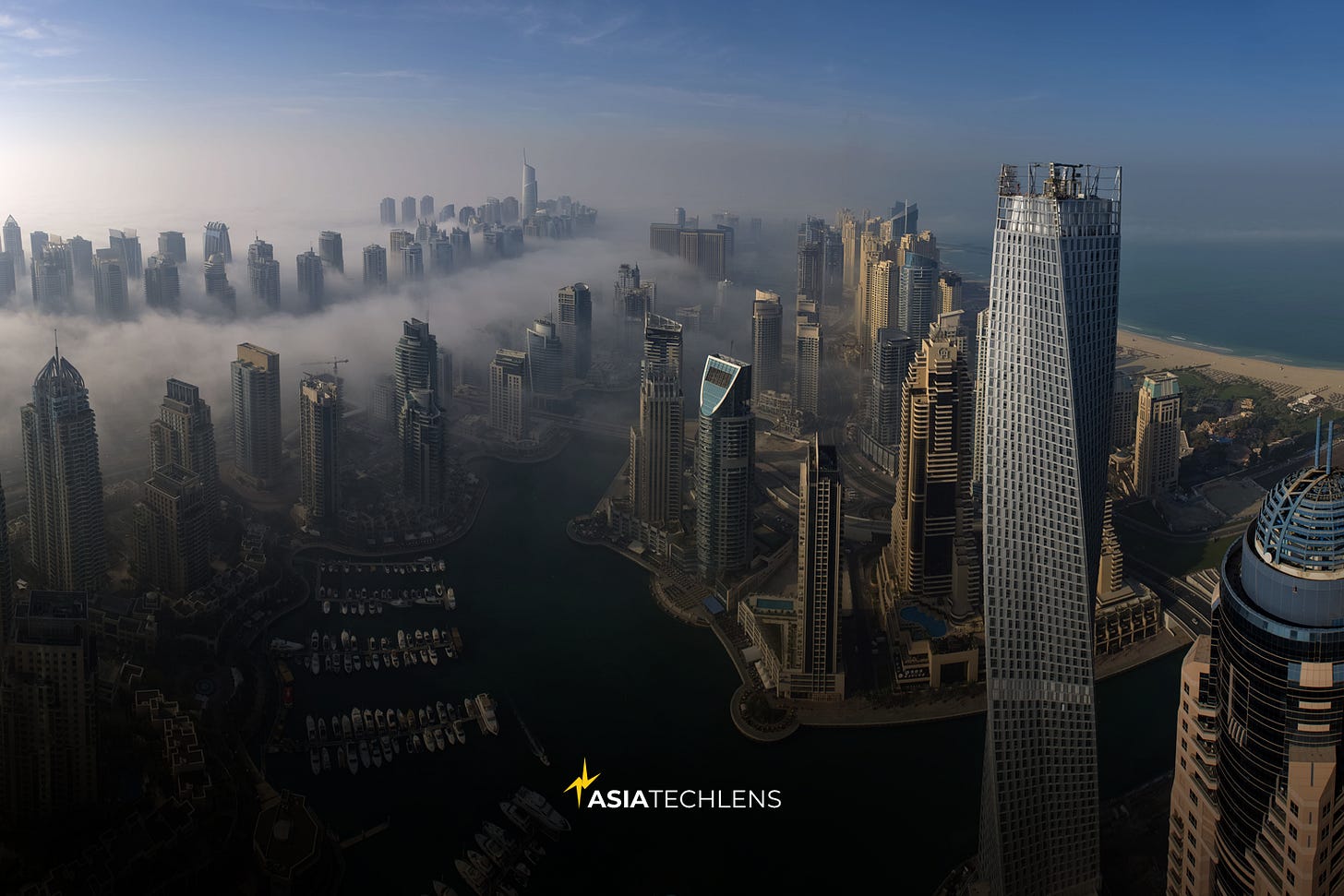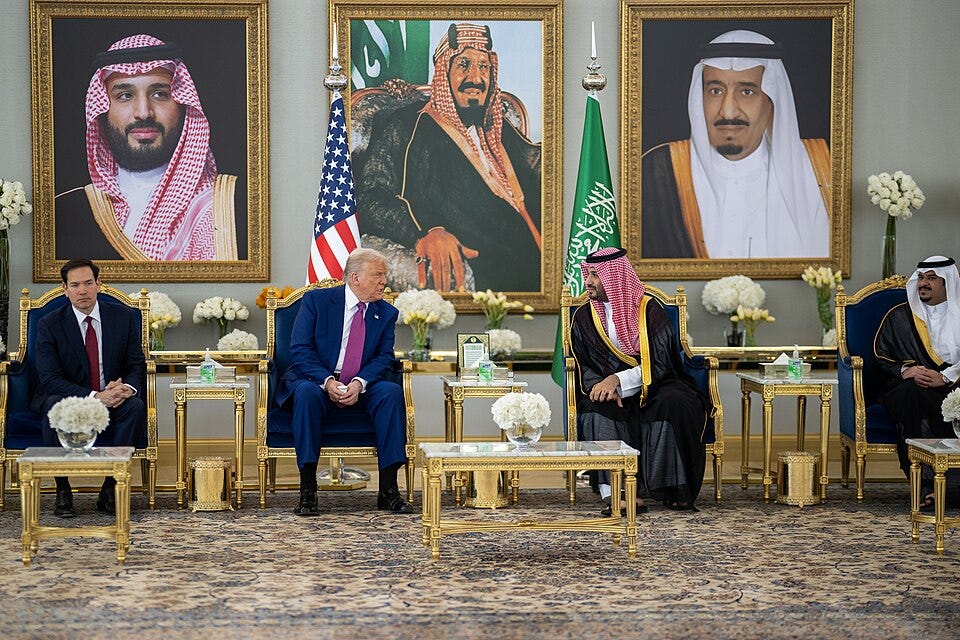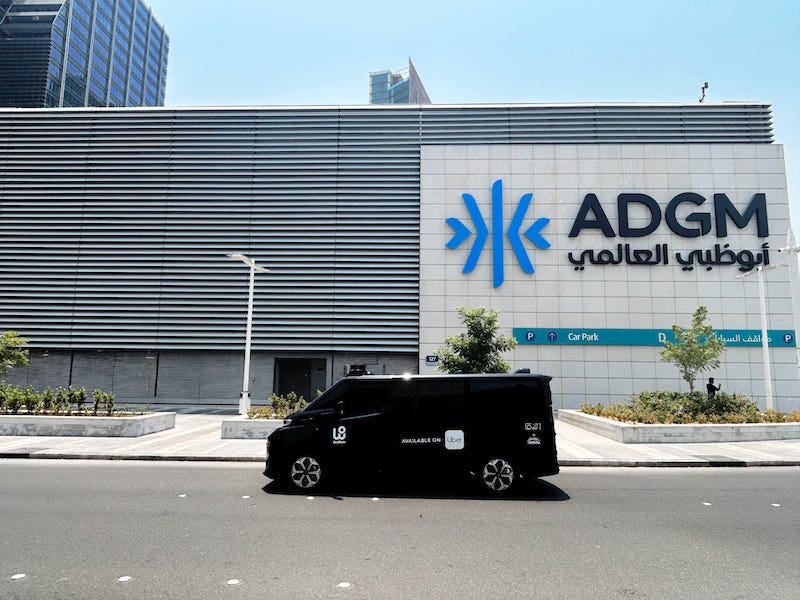From Oil to Algorithms: The Middle East’s New Role in US–China Tech Rivalry
Saudi Arabia and the UAE are recasting themselves as AI hubs, luring both US and Chinese giants with vast funds and promises of neutrality

The Gulf’s oil giants, Saudi Arabia and the UAE, are no longer content with being just energy superpowers. They are now betting big on technology and artificial intelligence, aiming to future-proof their economies and ease reliance on fossil fuels. Their new ambition: to become global AI hubs backed by billions of dollars in state investment.
Saudi Arabia is moving at breakneck speed, powered by its sovereign wealth fund, the Public Investment Fund. At the center is Humain, a full-stack AI company chaired by Crown Prince Mohammed bin Salman, which has been tasked with everything from building data centers to developing advanced AI models.
Alongside it sits Alat, a manufacturing conglomerate designed to give the kingdom a domestic hardware and semiconductor backbone. Both are core pillars of Vision 2030, Saudi’s long-term diversification plan. Then there’s Project Transcendence, a $100 billion plan to launch 300 AI-driven startups by 2030, which is a sign of just how far the kingdom wants to go.
The UAE, meanwhile, has been laying the groundwork for years. It was the first country in the world to appoint a Minister of State for Artificial Intelligence back in 2017, and it followed up with the National AI Strategy 2031 to embed AI across sectors. Today, Abu Dhabi’s state-backed fund G42 is striking deals with Microsoft, OpenAI, and Nvidia, while Stargate UAE is pitching itself as one of the world’s largest AI infrastructure hubs.
These sweeping ambitions are pulling in heavyweight partners from both sides of the Pacific, as both Washington and Beijing see the Middle East, specifically the six wealthy countries that make up the Gulf Cooperation Council (GCC), as a proving ground where US and Chinese tech giants can test their influence, one mega-deal at a time.
The US Playbook
American tech giants have been locking in billion-dollar partnerships across the Gulf as the region doubles down on AI. Nvidia agreed to supply at least 18,000 of its advanced Blackwell GPUs to Humain, while AMD pledged a $10 billion investment in AI infrastructure alongside the same company.
Amazon’s AWS has pledged $5 billion for an AI Zone in Saudi Arabia, while in Abu Dhabi, Microsoft invested $1.5 billion in G42 in 2024, tying the Emirati AI firm’s growth to its Azure platform. By May 2025, G42 was already scaling up with Stargate UAE, a new AI campus built with OpenAI, Oracle, Nvidia, SoftBank, Cisco, and likely Microsoft.
The momentum peaked during President Donald Trump’s May 2025 visit to Saudi Arabia, when American firms, including Google, Oracle, Salesforce, AMD, and Uber, announced $80 billion worth of commitments in what officials called “cutting-edge transformative technologies”.
For Washington, these deals mean a foothold in one of the fastest-emerging tech markets. By supplying chips, cloud, and startup capital, American firms ensure their technology underpins the Gulf’s digital future - a crucial step as the US seeks to preserve its edge in the global AI race.

China’s Countermove
China certainly doesn’t want to be left behind. For years, Southeast Asia was the default launchpad for Chinese firms expanding overseas. Now, as the Middle East reinvents itself as an innovation hub, it’s becoming a more attractive springboard.
From food delivery and e-commerce to cloud infrastructure and electric vehicles, the country’s tech giants are also carving out their space in the Gulf.
Tencent Cloud is deepening its Gulf presence with a new Saudi cloud region, backed by an investment of more than $150 million. This follows Huawei, which launched a cloud region in Riyadh in 2023 and has been strengthening its presence since.
China’s consumer tech firms are also testing the waters. Meituan, through its food delivery arm Keeta, has been aggressively hiring and expanding across Saudi Arabia since last year. It has recently launched in Qatar, and media reports suggest that Bahrain and the UAE could be the next markets in the region.
Meanwhile, autonomous mobility players like WeRide, Pony.ai, and Baidu’s Apollo are launching pilots and striking partnerships across the Gulf. One standout deal: Uber and WeRide teaming up in Abu Dhabi, a move that underscores the region’s openness to Chinese autonomous vehicle experiments.

On the hardware side, Lenovo struck a $2 billion deal with Alat, broke ground on a PC and server plant in Riyadh in early 2025, and soon after announced its new regional headquarters in the city.
Semiconductor and solar players are also lining up: TCL Zhonghuan, through its Lumetech joint venture with PIF, committed $2.08 billion to build a silicon wafer factory in Saudi Arabia in mid-2024, while China Energy Engineering Corp secured a $972 million contract to construct a 2-gigawatt solar project that same year.
Chinese EV champion BYD is doubling down on the Gulf market. It expanded its retail footprint in the UAE with new model launches this year and entered Saudi Arabia with a flagship showroom in May 2024.
For China, the strategy centers on building hard assets and physical infrastructure: factories, solar farms, EV showrooms, and logistics networks. It’s an approach that echoes Beijing’s Belt and Road playbook, which is to plant deep roots in the region through tangible projects and long-term presence.
As Li Yang, Associate Professor of Marketing and Associate Dean for the MBA Program at CKGSB, noted, “As the world becomes increasingly multipolar, China and the Middle East find common ground in their shared ambitions for modernization, digitalization, and diversification. The region is becoming a key partner in China’s outward economic trajectory, not just as a market, but as a co-innovator, testbed, and gateway.”
The Balancing Act
The Gulf has learned to play both sides, and neither Washington nor Beijing seems ready to force a choice. For the US, especially under Trump, the priority is securing business and AI footholds rather than picking fights over Chinese projects. Saudi Arabia and the UAE are also too important as security and energy partners for Washington to risk alienating with ultimatums.
China, meanwhile, is content to share the table so long as it can lock in lasting infrastructure and manufacturing deals.
As Denis Simon, a US-based expert on China’s higher education and science, puts it: “The US and China are playing a big game on a global scale but these countries want to play with both players and not get drawn into that [US–China rivalry].” Riyadh in particular is increasingly dealing on its own terms, positioning itself as a neutral ground for both American and Chinese companies, as well as AI experts.
The result is a rare balance: the Gulf extracts the best of both worlds, while the US and China tolerate this dual track because the stakes - markets, contracts, and influence - are simply too high to walk away.
For More Info on Asia Tech Lens

